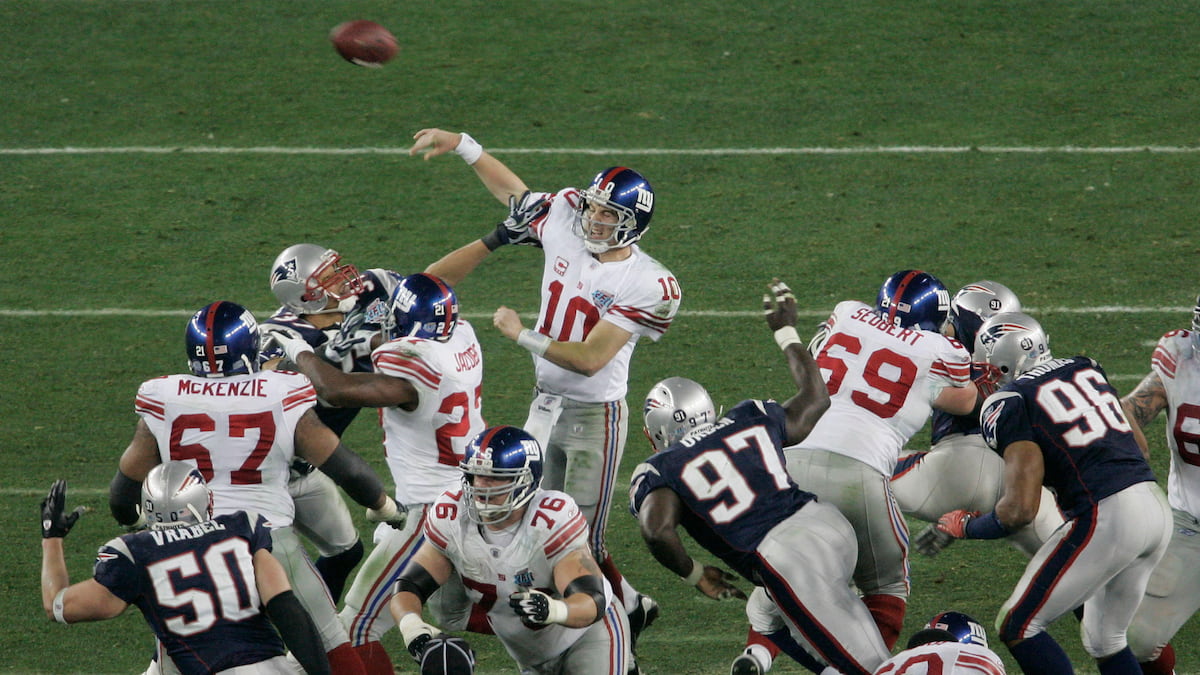Latest Sports Picks, News and Previews

The Super Bowl, the pinnacle of American football, has been the stage for some of the most unexpected moments in sports history. While every team that reaches this showdown on the grandest stage has proven its worth, a handful of Super Bowl matchups have produced stunning upsets that defied the odds and left fans in awe.
Here are five of the biggest Super Bowl upsets in history, each defined by pre-game spreads or the disparity in seeding of the teams involved.
One of the biggest Super Bowl upsets occurred in the modern era when the New York Giants, who finished second in the NFC East with a regular season record of 10-6, defeated the previously unbeaten New England Patriots in Super Bowl XLII. The Patriots, led by Tom Brady, entered the game with a perfect 18-0 record and were 12.5-point favorites.
However, the Giants’ defense, anchored by a relentless pass rush, managed to stifle the high-powered Patriots offense. The game is best remembered for Eli Manning’s escape from a potential sack and his completion to David Tyree, who made the famous “Helmet Catch.” This play set up the winning touchdown, and the Giants emerged victorious with a 17-14 score, ending the Patriots’ quest for a perfect season.
Super Bowl III is perhaps the biggest Super Bowl upset in NFL history due to it being the largest point-spread upset and its impact on the legitimacy of the AFL-NFL merger. The Baltimore Colts were 18-point favorites and were widely expected to dominate the AFL-champion New York Jets.
However, Jets quarterback Joe Namath famously guaranteed a victory three days before the game. “Broadway Joe” backed up his bold claim by leading his team to a 16-7 win. Namath’s efficient play-calling, in combination with an exceptional performance by the Jets’ defense, ensured the Colts never found their rhythm.
In Super Bowl XXXVI, the New England Patriots, led by a relatively unknown quarterback named Tom Brady, faced the St. Louis Rams, known as “The Greatest Show on Turf.” The Rams were 14-point favorites, boasting an explosive offense led by quarterback Kurt Warner, running back Marshall Faulk and wide receivers Torry Holt and Isaac Bruce.
However, the Patriots’ defense managed to contain the Rams’ high-octane attack, and Brady orchestrated a game-winning drive in the final minutes. Adam Vinatieri’s 48-yard field goal as time expired gave the Patriots a 20-17 victory, marking the beginning of the Patriots’ dynasty under Brady and head coach Bill Belichick.
Super Bowl IV featured the Kansas City Chiefs, representing the AFL, against the NFL’s Minnesota Vikings. The Vikings were 12-point favorites, having dominated the NFL with a powerful defense and efficient offense. However, the Chiefs, led by coach Hank Stram and quarterback Len Dawson, forced multiple turnovers, and Dawson’s leadership on offense led the Chiefs to a convincing 23-7 victory.
This win, coupled with the Jets’ victory in Super Bowl III, solidified the AFL’s competitiveness and set the stage for the eventual AFL-NFL merger and is one of the biggest Super Bowl upsets.
Super Bowl XXV is remembered for its dramatic finish and the significant upset pulled off by the New York Giants over the Buffalo Bills. The Bills, with their high-powered “K-Gun” offense, were 7-point favorites and expected to secure their first Super Bowl victory. However, the Giants, under coach Bill Parcells and backup quarterback Jeff Hostetler, employed a ball-control strategy that kept the Bills’ offense off the field.
The game culminated in one of the most famous missed field goals in NFL history, as Bills kicker Scott Norwood’s 47-yard attempt sailed wide right, giving the Giants a 20-19 victory and joining our list of the biggest Super Bowl upsets ever.

Zach has been a published sports writer since 2018 specializing in college football & basketball, MLB and NFL content for multiple publications.